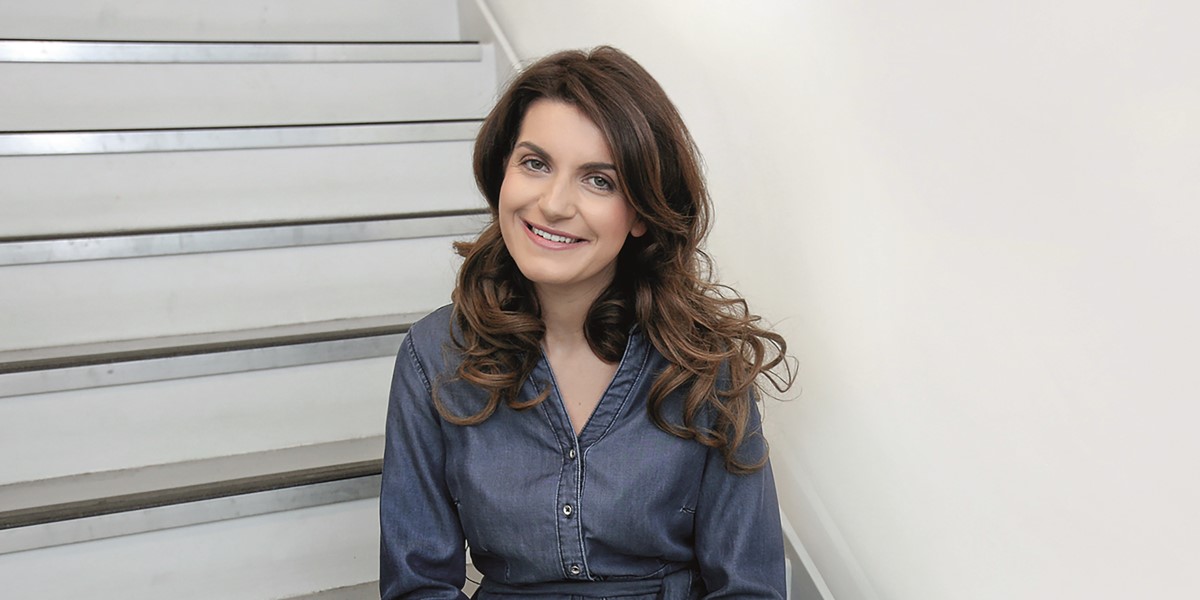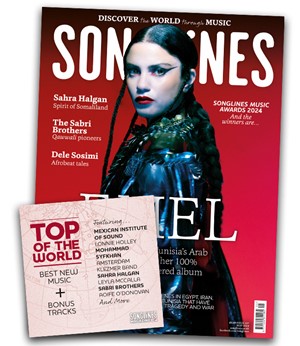Friday, August 26, 2022
Georgia Mann: My World
BBC Radio 3 presenter Georgia Mann takes Simon Broughton on a sonic trip through her world music highlights and the sounds that have moved her

Unusual at BBC Radio, Georgia Mann works as both a presenter and producer. She’s on air five days a week presenting Essential Classics from 9am till noon. But she’s also produced The Listening Service with Tom Service and Words and Music, a free-ranging intersection of words and music. It was recording an edition of the latter near the Alhambra in Granada that gave her what she describes as “one of the most magical musical experiences I’ve ever had.”
It was a special edition of Words and Music called ‘Nights in the Gardens of Spain’ – part of a season that Radio 3 did on the Iberian Peninsula. They recorded flamenco singer Juan Panilla with guitarist Francisco Manuel Díaz in the latter’s workshop where he also makes guitars. “He was quite blasé that Leonard Cohen popped in to have his guitar patched up,” says Mann. “It was a tiny space, and acoustically speaking just a wooden box full of other wooden boxes, but the sound was enveloping – filling every cavity of your aural system and mind. Juan, in his T-shirt and jeans, just opened his mouth and this extraordinary sound came out. This heart-rending, soulful sound filled every inch of the space. It will remain with me till my dying day. Outside the door we were a short walk away from the Alhambra where we then recorded the sound of the water in the fountains and the cicadas at sunset. I’ve never been more aware of music being born out of climate and place. It was magical.”
“Hearing it there,” she continues, “the music made so much sense. The place unlocks it because it’s born out of climate, geography, landscape and historic pain imprinted into the environment in Andalucía – these echoes you get of what happened to the Jews, Muslims and Gypsies from the 15th century onwards. Juan was relating the sound to the call to prayer in the Islamic world and when you think of the Moorish history of southern Spain it makes perfect sense, but it hadn’t penetrated my mind before. They say that the flamenco ‘olé’ comes from ‘Allah’ and that whole Islamic lexicon; it was like scales falling away from my eyes.”
Georgia Mann began as a local radio reporter and then went to Radio 3 to join the production team on the drive-time programme In Tune – “that meant ferrying guests up and down in the lift.” She doesn’t come from a musical family, although her father is a big fan of Renaissance polyphony and, as her mother is Irish, “there were The Chieftains from quite early on.” She has always been interested in singing – “bouncing around in Gilbert & Sullivan operetta, in choirs and doing ensemble singing.” She admits that when listening to music, it’s voices that she feels drawn to. “There is something visceral about the voice. When I listen to Georgian choral music or Corsican polyphony it seems to hit me somewhere in the solar plexus.”
She mentions a specific piece of Corsican polyphony that she heard when producing an edition of The Listening Service on sacred music. It was a track called ‘Gosos’ by the Tenores su Cuntrattu de Seneghe from Music of Sardinia on Naxos World. “On Radio 3 we play a lot of smooth, polished, celestial Renaissance polyphony – like Palestrina – which is beautiful. But I really respond to the grit and lack of perfection in these ordinary voices. It’s the imperfection that makes it so powerful and what makes it really weird is that there’s this ‘ghost tone’ that hovers among it all. No one is actually singing it, but if anything is going to tell you something about sacred music it’s that there is literally a Holy Ghost sitting among their voices. I’d love to witness this in situ. Sometimes to really make sense of this stuff you need to go and experience it where it’s being made. I’d love to see how it wraps its way around daily life in Corsica and how it fits with the environment and landscape.”
The track ‘Balkissa’, featured on the July issue’s covermount CD, is by Malian guitarist Anansy Cissé. In 2018 he and his group were on route to play at a peace and reconciliation festival in the Timbuktu region when they were stopped by an armed gang who held them captive and smashed their instruments. For a while he abandoned music, but his subsequent album, Anoura, turned out to be a rather beautiful response – gentle, reflective and ultimately hopeful. Mann is a big fan of West African music, with Fatoumata Diawara and Rokia Traoré being other artists she particularly admires. “I’m astonished by how much comes out of Mali,” she says. “What is amazing about Malian and West African music is this amazing melding of guitars and voice. Ancestral and contemporary at the same time. I remember [Late Junction presenter and Songlines contributor] Max Reinhardt saying if you want to find the blues, it’s in the desert blues of Africa and I hear that in Anansy Cissé. His guitar hooks blend beautifully with [the late] Zoumana Tereta playing the soku [single-string fiddle]. It makes me think of dusky summer evenings. There’s quite a sandy deserty quality in that record. It’s the grain of the guitar and the width and expansiveness of the production. I discovered this from our very own Music Planet with Kathryn Tickell.”
Mann is aware that with classical music people often say they don’t know where to start. And she feels the purpose of her programme Essential Classics is to act as a trusted curator. “We’re playing the well-loved pieces, but also trying to show what else can be essential. All the music is chosen very carefully and with the producers we have a good symbiotic way of working it out.” She feels that Music Planet, and indeed Songlines, plays a similar role in world music, which can seem even more intimidating. “World music by hint of its very name – music from the entire world – you think, ‘aargh how am I going to get my brain around this?’ But what it means to me is music that speaks to you. When I first heard Mariza on In Tune, she opened her mouth and I had to pick my jaw up several times from the floor. And when I heard that Corsican stuff – they are serendipitous discoveries. It’s about falling accidentally into something that takes you on an incredible journey. And it’s the journeying spirit that is important to anyone coming into world music.”
This interview originally appeared in the July 2022 issue of Songlines magazine. Never miss an issue – subscribe today

